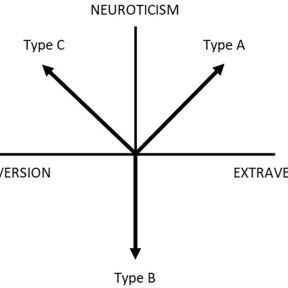
Type A and Type B Personality Theory
You know the "type:" So-called “Type A” personalities are hard-charging, determined to compete and to win. Combining traits such as drive and impatience, Type A was once thought to be related to heart disease—an association that has since been challenged. “Type B” was proposed as the more easygoing, tolerant personality, in contrast to Type A.
More recently, the concept of “Type D” (for “distressed”) personality has been studied by psychologists, leading to new explorations of personality-health associations.
Despite the popularity of personality-type concepts, personality scientists say that thinking in terms of distinct types is an oversimplified approach to personality.
Contents

Type A personality (or Type A Behavior) was originally described not by personality psychologists but by cardiologists, who thought that people who showed such personalities were at greater risk of cardiovascular disease. Type B personality was conceived as a less-intense personality type. A “Type C” was later proposed as a predictor of cancer risk. There is now ample reason to doubt that these supposed personality types are in fact correlated with disease progression.
Type A has been described as a behavioral pattern involving impatience and a sense of time-related pressure, irritability, and a competitive drive.
Physicians Meyer Friedman and R.H. Rosenman originated the concept in the 1950s after reportedly observing a connection between heart disease in patients and certain personality characteristics.
Individuals whose personality traits resonate with the “Type A” description—including characteristics like hostility—could potentially experience interpersonal difficulties as a result. But the more striking claims about Type A personality, namely that it is linked to heart disease, have been undermined by subsequent research as well as revelations about the role of tobacco industry funding in research on Type A.
Recently, psychologists have argued that “Type A” does not actually appear to be a category of its own, distinct from other personalities. As with other proposed “types,” someone who might have been called “Type A” can instead be thought of as having a collection of various personality traits, such as competitiveness and impatience, on which they rate relatively high.
Type B personality was proposed as a complement to Type A: a personality that lacked Type A’s hard-driving, irritable features.
In the 1980s, researchers described a “Type C cancer-prone behavior pattern” involving the suppression of one’s needs and negative emotions, compliance, and unassertiveness. They defined it as the “polar opposite” of the Type A pattern (whereas Type B entailed a lack of Type A traits). Subsequent work challenged the hypothesis that characteristics such as negative emotion suppression play an important role in cancer survival.

Type D—the D stands for “distressed”—is described as a combination of being inhibited in social situations and tending to experience negative emotions. The concept of Type D is distinct from Types A, B, and C, which have been defined based on characteristics such as high or low assertiveness and hostility. But as with the other "types," researchers who have assessed traits associated with Type D are interested in their potential connections to physical health.
Type D personality is a term for the combination of negative affectivity and social inhibition. Negative affectivity involves a tendency to experience negative states such as worry, irritability, and unhappiness. Social inhibition is gauged based on a person's agreement with statements like "I find it hard to start a conversation" and "I am a closed kind of person."
Early research suggested a possible connection between Type D traits and poorer outcomes for those with coronary heart disease, but follow-up work by other scientists failed to find supportive evidence for that link. Some evidence suggests measures of Type D characteristics are associated with certain psychological difficulties, including symptoms of insomnia and depression.
The negative affectivity factor of Type D was found to be related to the Big Five trait of neuroticism, while the social inhibition factor was associated with lower extroversion.










